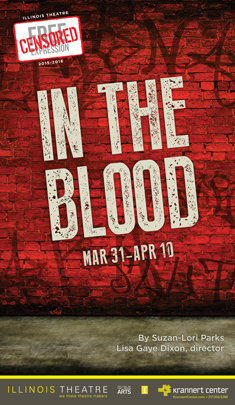This season, Illinois Theatre’s productions are based on banned books and plays and the idea of censorship of the written word. The program’s final production will be In the Blood, written by Suzan-Lori Parks and directed by Lisa Gaye-Dixon. Based off Nathaniel Hawthorne’s often-banned novel The Scarlet Letter, In the Blood follows the journey of Hester, a single mother faced with the challenge of providing for her five children. But such a broad summary falls severely short of doing the story justice. The play brings to life deeply complex characters, thought-provoking dual roles, and interactions that will make you confront and reconsider your assumptions about society and the people we encounter every day; this is a story you’ll have to see come alive on the stage to truly understand and appreciate. To find out more, I talked with director Lisa Gaye-Dixon.
Smile Politely: At first glance, In the Blood appears to offer a harrowing depiction of our society, but in reality, it’s much more hopeful and empowering. How would you more accurately describe the play?
Lisa Gaye-Dixon: There is a universality to this story — something in which everyone can see a bit of themselves and their connections to each other and the larger society. These kinds of stories can too easily become: “Aww, look at the poor (insert minority group here). Isn’t our society terrible? I’m not that way! Yes, more wine please,” sort of way. It’s only grim and harrowing if there is a recognition that the story is closer than one thinks… that it can happen to you, or to someone you love, that you are your sister’s keeper, that you should feel some connection to, remorse about, and desire to actually do something for the people in the play. If we feel it’s a story about the “other” then we don’t connect as viscerally or immediately.
And — there is humor — much more than one would think! I always look for it in anything I do.
SP: The play is described as one that “offers a voice to the voiceless”. With this in mind, what was your goal going into this production?
Gaye-Dixon: I usually have two goals: for the actors to have a good training experience, to challenge themselves and to open up and to be brave artistically, intellectually, emotionally, and socially. And then to bring that truth and discovery to their performances; for the audience, I don’t have a particular way that I want them to feel or think. That seems prescriptive to me. I want them to experience it however it hits them, to speak their truth, whether that’s a challenge or a reaffirmation.
SP: Are there any issues that you want them to be left thinking about?
Gaye-Dixon: The playwright clearly has ideas she wants folks to think on, and I would not presume to answer that for her, but as with all my work, I would want the audience to be able to connect with and root for the characters, and also perhaps to ponder their place in and connection to their local communities. I want viewers to think about how we see and assume things about people as we encounter each other in everyday life. These characters are very intelligent, something that is often assumed to be the opposite for homeless folk.
 SP: Speaking of the playwright, Suzan-Lori Parks wrote the play to have performers act in dual roles. What layer do you think this adds to the play?
SP: Speaking of the playwright, Suzan-Lori Parks wrote the play to have performers act in dual roles. What layer do you think this adds to the play?
Gaye-Dixon: I think the fact that the playwright wrote it specifically like that is interesting and that it says something. The playwright has two white actors playing black children along with other roles in Hester’s life. I think it’s an incredible challenge for them, especially as black actors and other actors of color and ethnicity are always asked or expected to play predominately white roles. So for the actors to experience and the audience to see the opposite of the hegemony happening is refreshing and a little frightening, and therefore good. All the actors have to code switch, all African American actors have to do this all the time, so the fact that the white actors are doing it for the first time, and that the audience is seeing it – probably also for the first time – turns some of our societal assumptions on their heads.
SP: You brought up an intriguing point about turning some societal assumptions on their heads. Going along with this, would you say that the people in Hester’s life stray from the qualities that are traditionally associated with their roles? For example, we expect doctors, ministers, and friends to be helpful and selfless, but in the play, the people in these roles may come off as damaging. What’s your take on this?
Gaye-Dixon: I think the surface, generalized interpretation might be that, but I disagree. I see Amiga Gringa as a great friend and the doctor, while weak, shares with Hester something beyond our ability to comprehend from the outside — something of great depth and intimacy, something that benefits them both, even if only for a moment. I think it’s too easy to make generalizations about the characters and their impact upon Hester, especially because when we hear “a play about a homeless woman with five children by five different fathers”, we assume a lot, given what we think about these things in society. I think the playwright knows this, and created some of the info about this piece specifically to make us dig beyond our initial reactions of superiority and distance. Certainly it is true that some of them have a definite damaging effect, but even in those instances, we can see their fragility and loneliness, and maybe some of the reasons they act as they do. They are all complex, three-dimensional characters and each time I think I have decided one is “good” or “bad”, I discover something behind that decision that gives room for reassessment.
———
In the Blood will be playing at Krannert Center (500 S. Goodwin Ave. Urbana) from March 31 through April 2 and April 5 through April 9 at 7:30 p.m. and on April 10 at 3 p.m. Tickets can be purchased online, by phone at (217) 333-6280 or in person at the ticket office (10 a.m. – 6 p.m. every day).
Jimin Shim is a contributing writer for Smile Politely’s Arts section who smells her way through life. A Colorado native, she wishes Illinois had more mountains, but appreciates the flatness when she’s biking in a hurry. She unfortunately isn’t witty enough yet to have a Twitter but you can say hello via email.









 Jimin Shim is a contributing writer for Smile Politely’s Arts section who smells her way through life. A Colorado native, she wishes Illinois had more mountains, but appreciates the flatness when she’s biking in a hurry. She unfortunately isn’t witty enough yet to have a Twitter but you can say hello via
Jimin Shim is a contributing writer for Smile Politely’s Arts section who smells her way through life. A Colorado native, she wishes Illinois had more mountains, but appreciates the flatness when she’s biking in a hurry. She unfortunately isn’t witty enough yet to have a Twitter but you can say hello via